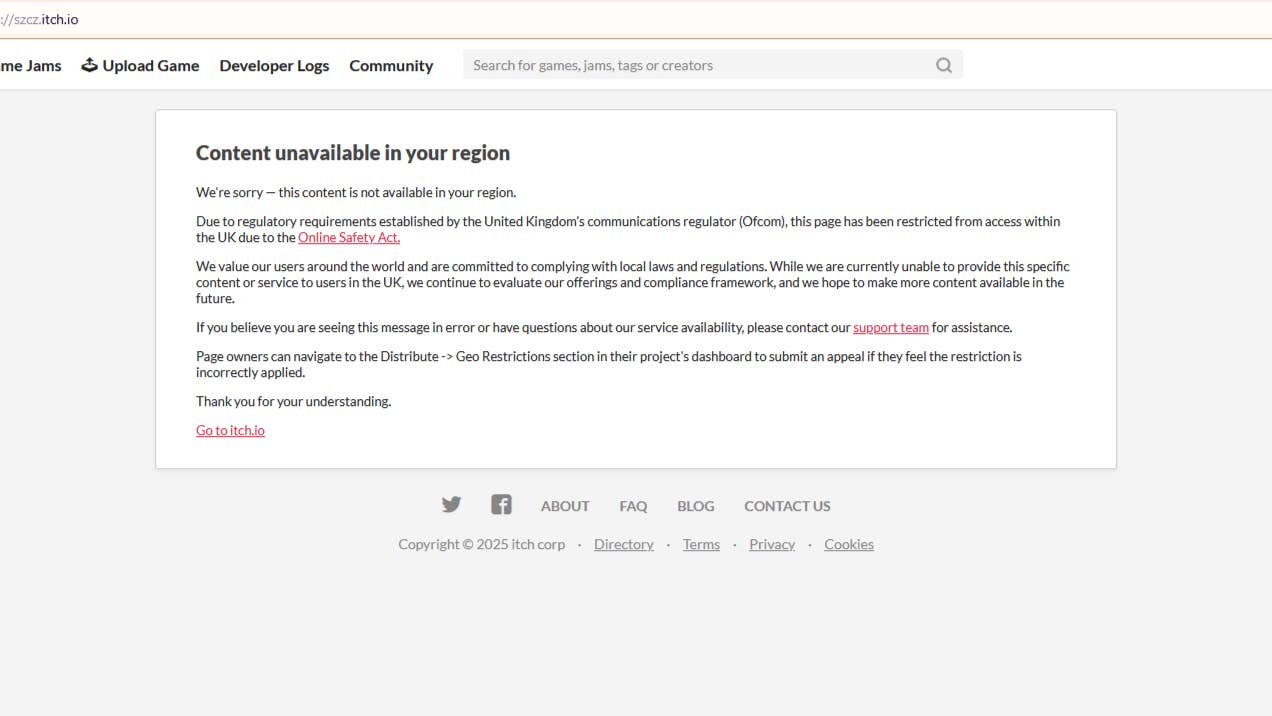“This is not a law fit for purpose,” says the journalist and game developer John Szczepaniak. “This is idiocy and insanity of the highest order.”
Szczepaniak made the game Lady Priest Lawnmower as a joke – riffing on the ZX Spectrum’s similarly silly Advanced Lawnmower Simulator. But when the UK’s Online Safety Act (OSA) came into effect in late July, he found that British users of itch.io could no longer access his author page.
“It’s all just a parody,” Szczepaniak says. “But as you can see Lady Priest Lawnmower is deemed adult, and if only one game is deemed adult your entire profile page is blocked.” He believes the game tripped an alarm because it features kidnapping. “What about the original Donkey Kong, where Pauline is kidnapped?”
Leaf Corcoran, itch.io’s founder, has said that author pages containing NSFW or adult content will remain blocked in the UK – until the site finds a ‘digital ID’ partner that can provide an age verification solution they’re happy with. In the meantime, itch.io is encouraging developers to submit an appeal if they think they’ve been incorrectly targeted. “I refuse to do this. This entire OSA banning nonsense should never have taken place,” Szczepaniak says. “I want the OSA laws repealed!”
The OSA is a set of laws intended to protect users online. It puts a new onus on game developers and platform holders to prevent children from accessing anything harmful or age-inappropriate. It requires that parents and kids are given clear and easy ways to report problems, and that adults be given more control over the type of content they see.
Frustration and panic
This change has been a long time coming – visible on the horizon and well-signalled by the UK government – but its arrival has led to a wave of frustration and panic among those who make games and run their associated communities. “While we will always comply with legal requirements, we disagree with this policy’s approach,” writes itch.io’s Corcoran. “We believe these restrictions harm creative expression and make it harder for independent creators to reach their audiences.”
Ofcom, the UK’s independent regulator of online safety and enforcer of the OSA, now has dedicated members of staff who are focused on and engaging with games companies.
“I think that’s possibly why we as an industry feel a bit more exposed, just because this is one of the first times that a regulator has paid attention to us from day one,” says Isabel Davies, a senior associate at the tech-focused law firm Wiggin. “Whereas normally what happens is social media companies get hit with a new piece of legislation, and we get somewhat taken along for the ride.”
Since the video-game boom of the COVID-19 pandemic, governments and regulators have started paying special attention to the interactive arts. “We’re on a lot more people’s radars,” Davies says. “I think the OSA is just a prime example of one of those situations.”
The Act was passed in 2023, and Ofcom has been consulting with companies inside and outside the games industry ever since. “We weren’t completely caught off-guard,” Davies says. But in the last few weeks, a requirement for companies to protect children from certain ‘legal but harmful’ content has come into force.
“This is one of the first times that a regulator has paid attention to us from day one”
Isabel Davies, Wiggin
“That was also the same time that pornography sites were told to start age-blocking kids, which is why I think this has caused such a kerfuffle,” Davies says. “And one of the things that I think has been oversimplified is that you see some commentators out there saying you have to do age assurance in all cases.”
Age-gating might be a great help in compliance with the law, but in many instances, it may also be overkill – even for game services that include user-generated content, chat, and community features.
“What you do have to do are your risk assessments,” Davies says. “Assess your risks properly and work out what measures you need to employ that may or may not involve age assurance. There may be other ways you can achieve certain goals to protect people.” If a games company is already employing great moderation tools and parental controls, for instance, it might meet many of its obligations that way. “So it’s really important for any service, including games, to not jump the gun with any of this.”

Even when age-gating is necessary, there’s room for nuance. One example of a thoughtful approach to compliance is Newgrounds, the venerable browser game portal. Despite missing Ofcom’s most recent deadline, the site has been working with the UK regulator for the past year. Its plan involves a number of smart assumptions – for instance, that any UK user with an account more than ten years old or access to a credit card is already over the age of 18. “Regardless of age verification, these overhauls have been benefitting the site with better performance and will make NG easier to maintain into the future,” says founder Tom Fulp.
As Fulp notes, however, this invention was born of sheer necessity in the face of more expensive solutions. “We are not planning to offer things like ID checks or facial recognition because these require us to pay a third party to confirm each person,” he writes. “Because Newgrounds runs at a loss and doesn’t monetize users very well, this is not an option for us. As Wired noted, Big Tech is the only winner of the Online Safety Act because smaller websites can’t afford to keep up with this sort of regulation.”
Administrative burden
One of the louder criticisms of the OSA is that it’s particularly unfriendly to smaller companies, for whom simply parsing the thousands of pages of official guidance is a lengthy and disruptive process. “Certainly for me as a lawyer, I’m aware that there is a lot to get through,'” Davies says. “So as someone who isn’t in this area, I can completely understand why they’re probably thinking, ‘What is this!?'”
It’s perhaps not surprising that this administrative overwhelm – along with the prospect of fines capping at £18 million or 10% of annual global turnover, whichever is higher – has frightened some companies into temporarily suspending services in the UK while they figure out the details. And it’s important to note that the OSA arrives against a backdrop of wider moderation and censorship concerns. Platforms like itch.io have been scrambling to address the complaints of prudish payment processors, which has led to some developers suffering a double blow when it comes to discoverability.
Robert Yang, whose games about gay culture sometimes involve nudity, was already subject to a delisting on the itch.io store. And in the course of researching this piece, GamesIndustry.biz discovered that his creator page is currently inaccessible in the UK as well. “I wasn’t aware,” Yang says. “I’m obviously not happy. I have plenty of games that aren’t adult games too.”
Such shotgun measures only feed fears that spaces for risk-taking art are being squeezed, and that the ability of video games to carry messages will suffer as a result. “My silly little amateur games are an insignificant casualty in a much greater fire that has obliterated freedom of expression and freedom of thought in the UK,” Szczepaniak says.
“When GDPR came out in 2018 there was a massive panic, and it took everyone a while to get their heads around things”
Isabel Davies, Wiggin
Yet Davies hopes that in the long term, working with the Act will become more straightforward. “When GDPR came out in 2018 there was a massive panic, and it took everyone a while to get their heads around things,” she says. “My hope is that as time goes on, compliance will get a bit easier. It will become a bit more of a known thing. People will have gone through the process. But as of right now, I think for many indies it will feel like a big burden. Which is why it’s important to speak to your trade bodies, your advisors and communities about this.”
Davies recommends the digital tools that Ofcom has published on its website to help navigate the risk assessment process. “I would say it’s a starting point, it’s definitely not the be-all-and-end-all,” she says. “But it’s a really helpful way to get your head around, ‘OK, what is Ofcom expecting to see? And how do I assess the risks of someone trying to recruit another user for terrorism in my service, for example?'”
As scary as the Act can seem, small businesses shouldn’t worry that they’re suddenly going to be shut down by an unexpected fine. “Ultimately, Ofcom isn’t expecting everyone to have everything resolved immediately,” Davies says. “It’s certainly at the period now where it seems to be doing some enforcement against certain sectors, but equally, in games it’s currently here to engage and help businesses understand what they should be doing.”
Time to assess
If a company’s service presents a big risk, then it might be wise to pause it. But plenty of companies might have less to do than they think.
“If you’ve had a long history of your forum running into issues with illegal content, then maybe turn it off for now until you know what you need to do,” Davies says. “But if you’re running a small forum which is used by a relatively small number of people, and the conversations are mainly about your game or bug tickets or some fan art that people have drawn, you would hope it’s probably going to be relatively low risk in practice. Again – get your risk assessments done!”
“Thanks to the OSA, I’m being treated as some sort of pornographer”
John Szczepaniak
If a time is coming when game platforms will find a more harmonious balance with the OSA, for the benefit of both creators and fans, it can’t come soon enough. In our current moment, rushed and overbearing implementations of the law are leading to upset and disillusionment among the very creative minds our industry depends on.
“Itch is an escape from reality, and an escape from the corporate nature of triple-A gaming,” Szczepaniak says. “None of my individual games have had more than 200 downloads. But making them is fun for me. Yet thanks to the OSA, I’m being treated as some sort of pornographer? Some sort of pariah that needs to be kept away from society to keep it safe?
“I feel deeply saddened that I am banned in the UK.”





